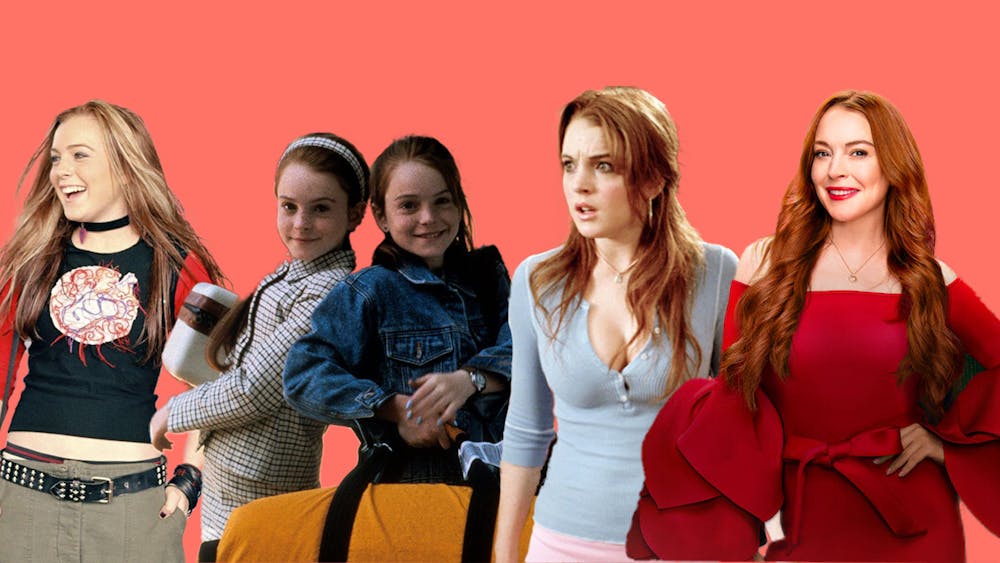The screen opens up with beautiful shots of a wedding on the Queen Elizabeth II ship. Nat King Cole’s crooning voice on “L-O-V-E” sounds through the screen. Fireworks begin to sizzle to the edges of the frame. The credits roll: “Dennis Quaid … Natasha Richardson …”
“… and introducing Lindsay Lohan.”
Lindsay Lohan, whose first major film in nine years, Falling for Christmas, just premiered on Netflix, certainly does not need any introduction. But Nancy Meyers’s 1998 remake of The Parent Trap did indeed introduce the world to Lindsay Lohan. At only eleven years old, Lohan captured America’s heart with her adorable freckles, convincing British accent, and stunning capability to convey both strong comedic timing and emotional intelligence.
Lohan was clearly a star and continued to rise in the ranks of Hollywood as she grew up. She followed up The Parent Trap with more charming adolescent roles in 2000’s Life Size and 2002’s Get a Clue.
Then in 2003, Lohan scored her biggest box–office hit to date with 2003’s Freaky Friday. The film grossed over $160 million at the box office and earned rave reviews. Roger Ebert, the late, famed film critic said in his review that Lohan “has that Jodie Foster sort of seriousness and intent focus beneath her teenage persona.” Ebert was among several critics who pegged Lohan as a “Jodie Foster type,” or a child actress who so obviously had the talent to transition to an adult career.
After Freaky Friday, Lohan also quickly became a subject of adoration for the American press. Upon the release of the iconic Mean Girls in 2004, Lohan had a spread in Vanity Fair in which she was anointed “The Queen of Teen.”
All stars pointed to Lohan following in the steps of teen stars like Foster, Natalie Portman, and Reese Witherspoon; however, the early 2000s were no time to be a famous young woman in America. Unfortunately for LiLo, she had all the right moves, but couldn’t stick the landing.
A combination of unfortunate career moves (Confessions of a Teenage Drama Queen, missing out on starring as Blair Waldorf in a Gossip Girl movie), alleged substance issues, and media scrutiny, Lohan’s adoration from the press quickly turned into cruel obsession.
If Monica Lewinsky proclaims herself to be “patient zero” of the Internet, then Lohan could claim the title as patient zero of a more established Internet culture. In the early–to–mid aughts, Perez Hilton and TMZ became the tastemakers of American popular culture, and Lindsay Lohan was always their flavor of the week.
Media outlets continued to pounce on Lohan’s missteps, publishing articles like “Lohan Busted for DUI – AGAIN! More Coke Found” and “Let’s Get the pAArty Started!” Lohan stopped getting film roles and became a permanent fixture in gossip blogs. A girl who was once on the precipice of becoming one of the biggest movie stars in the world was punched down to just a punchline.
In recent years, many have been eager to reassess her and highlight her undeniable talent rather than her personal struggles.
In The Ringer’s Rewatchables podcast episode about Mean Girls, host Bill Simmons echoed Ebert’s sentiments about Lohan, saying that at the time it appeared “[she was] gonna do these teen movies, and then win Oscars …. You’d kind of guess that she was gonna have a career for like 40 years.”
Simmons went on to liken the screen’s loss of Lindsay Lohan to that of an American tragedy — she had all the talent in the world, but she took too many irreversible wrong turns. Lindsay Lohan’s career is arguably American culture’s largest “What If?” of the twenty–first century. Maybe if she had better people around her, or maybe if she had this role instead of that one, everything could’ve been different. And while Lindsay definitely wasn’t perfect, no one was looking out for her, trying to preserve the talent and innate stardom that few young women in Hollywood have come close to replicating since.
Lohan’s new movie Falling for Christmas may not be Lohan’s The Silence of the Lambs, but it is being embraced by both audiences and critics who seem to be welcoming Lohan back to the screen with open arms. The film reached #2 on Netflix’s Top 10, and reviews praised Lohan, pointing to her “irrepressible charm” and “hilarious …. Yet […] also delicately faceted when melancholic moments arise.”
Lohan’s career may have petered out regardless of the press, but it is a true shame that the world will never know what she would have accomplished if the people around her had given her the support and protection she needed. There are many lessons to be learned from looking at Lohan’s life and career, but the biggest takeaway will always be her blinding, unquestionable talent as an actress, which hopefully will continue to be acknowledged as Lohan continues to dip her feet back into the waters of Hollywood.

